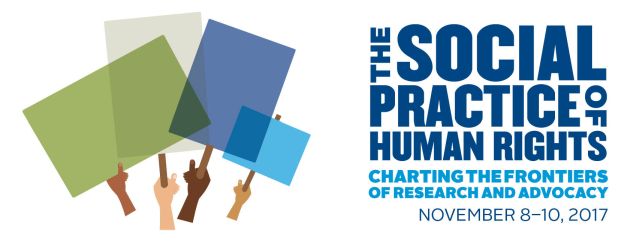
Start Date
11-8-2017 1:30 PM
Keywords
participatory community action research, homelessness, service-learning, advocacy
Abstract
Homelessness will be framed as a human rights issue, with reference to the Universal Declaration of Human Rights (e.g., Articles 25 and 27).
A participatory action research project (sustained by service-learning pedagogy) in homeless shelters will be described. In the shelters, we implement Behavioral Activation, which is a strategy to (a) transform the shelter environment; (b) empower shelter guests; (c) enhance their coping; and (d) expand their opportunities for overcoming obstacles associated with homelessness. We will present both quantitative outcomes (using validated psychometric measures) and qualitative outcomes (examining written comments of guests using grounded theory methodology) for shelter guests, including evidence that the project contributes to their perceptions of hope, perceived capability/motivation for employment/education, purpose/meaning in life, well-being (managing anxiety and depression), social/emotional support, and shelter social climate.
We will describe our plans for examining long-term outcomes for shelter guests, which involves quasi-experimental research to compare outcomes of shelter guests in Behavioral Activation with outcomes of other groups, such as: (a) guests who left shelters prior to Behavioral Activation implementation; (b) guests who declined Behavioral Activation; and/or (c) guests from similar shelters without Behavioral Activation.
The project’s expanding collaborative network will also be described, such as our connection with the Montgomery County Ex-Offender Reentry Program, which prepares and empowers ex-offenders as they pursue housing, employment, and other positive endeavors. Further, we will show the relevance of the Universal Declaration of Human Rights (Articles 27 and 29) to our use of service-learning pedagogy.
Outcomes for service-learning students are accessed via quantitative psychometric measures as well as qualitative approaches (examining written reflections using grounded theory methodology). We will review results of quasi-experimental research demonstrating that, relative to non-service-learning students, service-learning students assisting with this project show pre- to post-semester corrective changes in community service self-efficacy, stigmatizing attitudes, and awareness of privilege.
Included in
Participatory Community Action Research in Homeless Shelters: Utilization of Service-Learning Pedagogy in Research and Advocacy
Homelessness will be framed as a human rights issue, with reference to the Universal Declaration of Human Rights (e.g., Articles 25 and 27).
A participatory action research project (sustained by service-learning pedagogy) in homeless shelters will be described. In the shelters, we implement Behavioral Activation, which is a strategy to (a) transform the shelter environment; (b) empower shelter guests; (c) enhance their coping; and (d) expand their opportunities for overcoming obstacles associated with homelessness. We will present both quantitative outcomes (using validated psychometric measures) and qualitative outcomes (examining written comments of guests using grounded theory methodology) for shelter guests, including evidence that the project contributes to their perceptions of hope, perceived capability/motivation for employment/education, purpose/meaning in life, well-being (managing anxiety and depression), social/emotional support, and shelter social climate.
We will describe our plans for examining long-term outcomes for shelter guests, which involves quasi-experimental research to compare outcomes of shelter guests in Behavioral Activation with outcomes of other groups, such as: (a) guests who left shelters prior to Behavioral Activation implementation; (b) guests who declined Behavioral Activation; and/or (c) guests from similar shelters without Behavioral Activation.
The project’s expanding collaborative network will also be described, such as our connection with the Montgomery County Ex-Offender Reentry Program, which prepares and empowers ex-offenders as they pursue housing, employment, and other positive endeavors. Further, we will show the relevance of the Universal Declaration of Human Rights (Articles 27 and 29) to our use of service-learning pedagogy.
Outcomes for service-learning students are accessed via quantitative psychometric measures as well as qualitative approaches (examining written reflections using grounded theory methodology). We will review results of quasi-experimental research demonstrating that, relative to non-service-learning students, service-learning students assisting with this project show pre- to post-semester corrective changes in community service self-efficacy, stigmatizing attitudes, and awareness of privilege.


